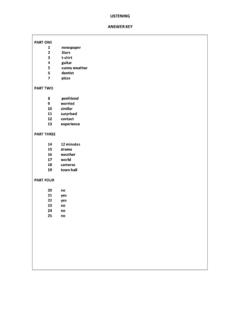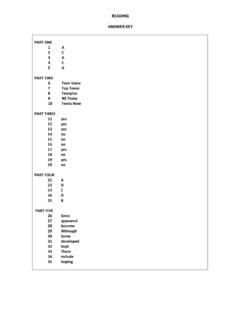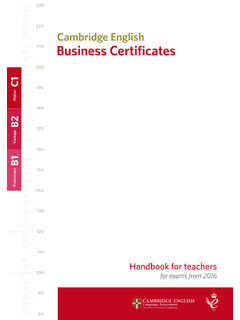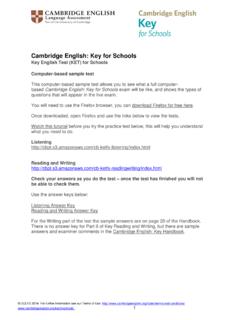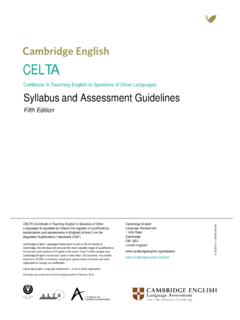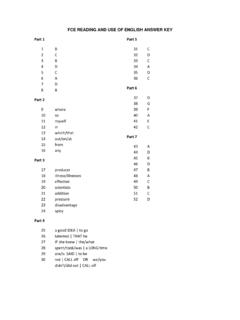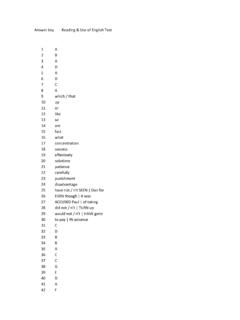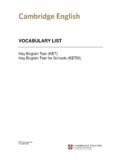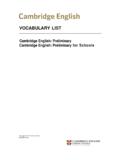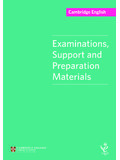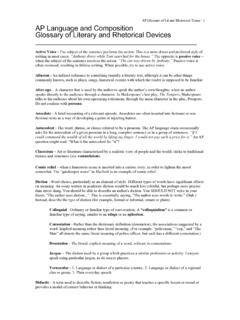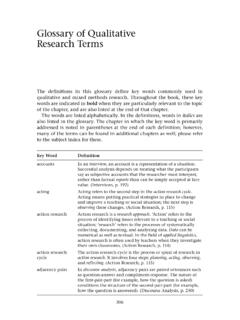Transcription of TKT teaching knowledge test glossary
1 glossary 2015 Page 1 of 57 TKT glossary OF ENGLISH LANGUAGE teaching (ELT) TERMINOLOGY The words in this glossary are in alphabetical order and are for all the TKT modules. Candidates preparing for any one module should make sure that they are familiar with all the words and phrases in the glossary . Candidates for all modules are also expected to be familiar with the Cambridge English: Preliminary (PET) Vocabulary List. The words and phrases included in the TKT glossary are not intended to provide a full or complete list of English language teaching terminology.
2 This glossary includes words and phrases for teaching knowledge connected to language, language use and the background to and practice of language teaching and learning as assessed in TKT. Words which are in bold are explained in the glossary . Terms included in the Appendix are for use in TKT: KAL ( knowledge About Language) only. A separate glossary is available for candidates preparing for TKT: CLIL (Content and Language Integrated Learning). Abbreviation noun A short form of a word or phrase; in addresses, Rd is an abbreviation of Road.
3 See contraction. Abstract adjective Connected to thoughts and ideas rather than real objects, situations or actions. A text can be abstract and we use abstract words to express things like thoughts ( believe), feelings ( love) or ideas ( beauty). Words for things that cannot be seen or touched are abstract words. See concrete. Academic adjective Things which are connected with education or connected with studying in schools, colleges or universities. For example, in school, maths is an academic subject; playing football is not. Access verb, accessible adjective (material) To be able to find and to use materials for lessons.
4 For example, teachers can access materials such as games and songs from the internet. Materials which are easy to find and to use are accessible. Accuracy noun The ability to do something without making mistakes. Accuracy is the use of correct forms of grammar, vocabulary, spelling and pronunciation. In an accuracy activity, teachers and learners usually focus on using and producing language correctly. See fluency. Achievement noun, achieve verb, achievable adjective Something you succeed in doing usually by making an effort; something done successfully, Sarah worked hard and passed her exam.
5 This was an achievement. Something which is achievable for learners is something they can succeed in. Achievement test: see test. Acknowledge verb To show that you have seen or understood something, the teacher acknowledged the learner s answer by looking at him and saying Yes . Acquire verb, acquisition noun (language acquisition) To learn a language without studying it, just by hearing and/or reading it and then using it. This is the way people usually learn their first language. See exposure, pick up (language). Action rhyme noun A classroom activity used mostly with young learners which includes words and sentences which end in the same sound.
6 For example One, two, three, touch your knee. Learners say the rhyme and perform the actions. See Listen and do/make/draw. Page 2 of 57 Activate previous knowledge phrase To get learners to think about and to say what they know about a topic. Teachers activate learners previous knowledge when they are preparing learners to read or listen to a text. For example, a teacher could prepare learners for a text about cooking by asking learners what kind of food they can cook. Research has shown that when learners previous knowledge is activated, reading and listening comprehension is increased.
7 See arouse/ generate/stimulate interest. Active role phrase Taking part and being involved and interested in something. When learners think about their own learning and what their own needs are and try to do things themselves to learn more, they are taking an active role in their learning. See passive role. Active voice noun In English grammar, there are active forms and passive forms. In an active sentence, the subject of the sentence does the action, active voice: The captain (the subject) scored the winning goal. The passive voice would be: The winning goal was scored by the captain.
8 See passive voice. Activity-based learning noun An approach to learning by doing activities and focusing on the activity rather than focusing on grammar and vocabulary. Learners do an activity in groups; they solve a problem, draw or paint a picture or make or build something. The rules of language used in the activity are looked at either after the activity or not at all. An activity-based learning approach is more common with school-aged children. Activity book: see book. Adapt verb (material) To change a text or other material, so that it is suitable to use with a particular class.
9 For example, a teacher thinks a text in his/her coursebook is too long and/or too difficult for his/her learners. He/she adapts the material by removing some of the more difficult paragraphs. Adjective noun An adjective describes or gives more information about a noun or pronoun, a cold day. A comparative adjective compares two things, He is taller than she is. A demonstrative adjective shows whether something is near or far from the speaker, this (near) book is interesting, that window (not near) is open. An ing / ed adjective describes things or feelings.
10 An ing adjective describes things or people, The book is very interesting. An ed adjective describes feelings, I am very interested in the book. A possessive adjective shows who something belongs to, It s my book. A superlative adjective compares more than two things, He is the tallest boy in the class. Adverb noun An adverb describes or gives more information about how, when, where, how much or how well something is done, he worked quickly and well. Affix noun and verb, affixation noun A letter or letters added to the beginning or end of a word to make a new word, which can be a different part of speech from the original word, interview, interviewer; er is an affix added to interview to make the new word interviewer.
